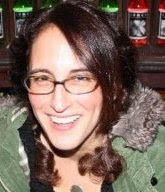
For months I’ve been attending workshops at Babeland, the women-friendly, sex-positive shop in New York City. In addition to the very popular workshop “Art of the Blow-Job” the store has an on-going “Sexy Moms Series” which I recommend to all parents.
Wednesday night’s free workshop was about “Raising Sex-Positive Kids”. Personally, I could hardly wait for this one and with good reason. Though I’ve put a great deal of effort into teaching my children about the mechanics of menstruation and birth, I still falter on the topic of sex in general. Part of me wants to keep my girls innocent and unaware of such realities and perhaps another part does not want them to experience that hideous moment when you realize your very own parents had to perform this task in order to create YOU.
But I have to brush those reservations aside, as that is my repressed upbringing instilling such prudishness. The cold fact is that if you do not speak to your children about sex they WILL learn about it in other ways outside of your control or approval.
Last week’s workshop was led by Amy Levine, a certified sexuality educator and sexologist (I love that title) who counsels adults on all matters of sexuality. For this workshop Amy, an articulate and adorably petite powerhouse, commanded the room, asking us to define what it is that we hoped to impart to OUR children about sex and to consider what we would have liked someone to have told US about sexuality.
This got the wheels turning and many adults confessed to having issues on both sides of the spectrum. Some came from households where sex was perhaps too openly encouraged and many came from families where the topic was verboten.
One of the points Amy made clear was that discussing sexual issues should be an on-going positive dialogue with our kids; not “the talk” kind of monologue. She pointed out that there are plenty of “teachable moments” in our lives that give opportunity for meaningful discussions. For example, what children see on TV, in movies or at school in addition to their questions about commitment, relationships, and body-image are all moments for exploration. All of those topics tie into the concept of “sexuality” in a broad and encompassing way. If you hear your child using the word “gay” as a derogatory adjective you can take that moment to discuss what the word means in our vernacular and how you feel about using demeaning terms. I remember the day my daughter asked, “Why does Hannah have TWO moms??” which caused me to launch into an explanation about gender roles and the notion of same-sex relationships being a part of our society.
This leads to another important point Amy made which is identifying your own values and beliefs then practicing the messages you want to share. This takes some time and thought to consider what you feel needs to be explained and what tone you will take. How will you actually address the definition of a “blow-job” when it’s posed to you by a curious sixth-grader who heard it at recess? What message do you want to deliver about homosexuality? Are you prepared to explain not only the mechanics of sex or masturbation but the notion that those activities evoke pleasurable feelings?
You can’t expect to have all the answers and it is perfectly acceptable to say to your child: “You know, I’m not sure how to answer that,” or “That topic is kind of uncomfortable for me; let me think about and we’ll talk later.” There are plenty of great age-appropriate books available to help guide you and your child through many of these topics. Certainly what a six-year-old should know is far different from a twelve-year-old. However, that a six-year-old should even know anything about sexuality was a bit of a revelation for me. I realized that keeping open communication, on ALL topics, is absolutely necessary for fostering a healthy relationship with my girls; and that communication has to include sex.
When I tested the waters the following day, my older daughter took the invitation to discuss questions about sex with a solemn nod. My seven-year-old child, however, looked at me with a curled lip and simply said, “Ewww.” She found it somewhat distasteful to discuss the topic with her own mother; however cool and fun she may find me (by her own admission). “Though”, she reasoned, “My friends' parents don’t know anything about sex and relationships because they’re all MARRIED.” Eureka! A teaching opportunity right there in front of me. And in the cozy comfort of their loft bed I stepped into the realm of imparting sexuality wisdom and acceptance one small moment at a time.
http://www.sexedsolutions.com/index.html
Recommended reading:
http://www.sexedsolutions.com/youngpeople.shtml
The Sexy Mom Series is jointly sponsored by New Space for Women’s Health and Park Slope Parents.

